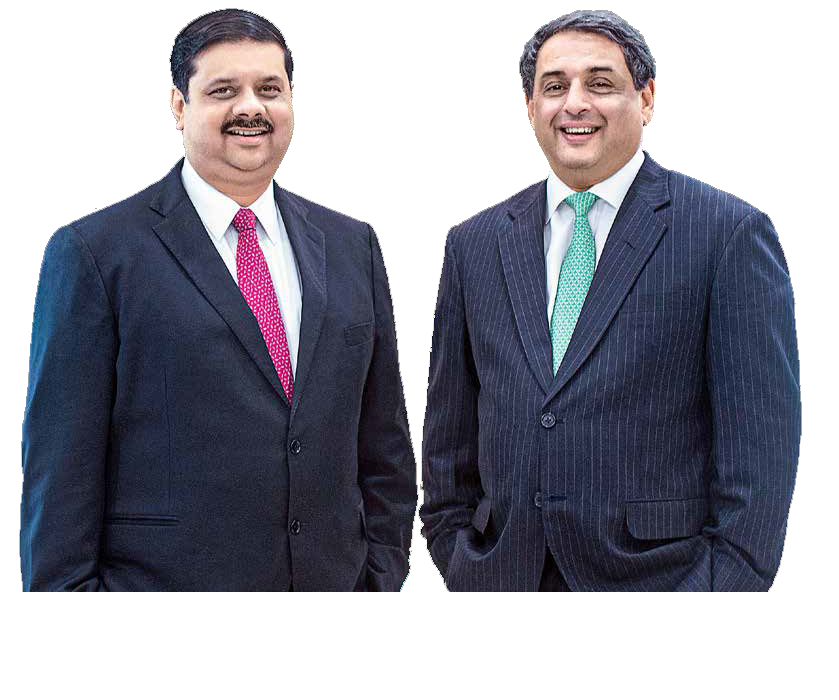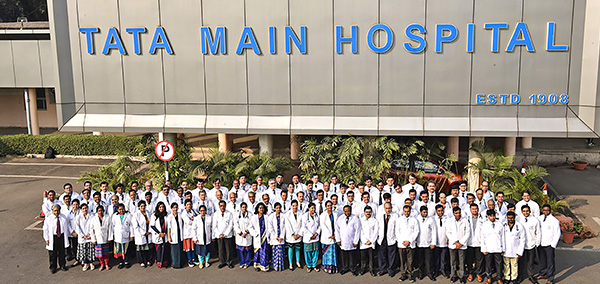
The COVID-19 outbreak towards the end of FY 2019-20 brought economic activities to a near-standstill in the first half of FY 2020-21. Restrictions imposed on movement of people and business activities to contain the spread resulted in the contraction of global GDP by 3.5% in CY2020. Since then, the global economy has been recovering, driven by fiscal stimulus and accommodative monetary policies, followed by good progress in vaccination.
Despite the challenges, uncertainties and complexities due to the pandemic, Tata Steel Group delivered a strong performance in FY 2020-21. Consolidated steel production was at 28.54 MnT while total deliveries stood at 28.50 MnT, marginally below that of the previous year. Our consolidated revenues increased by 5% to `1,56,294 crore, driven by strong underlying performance of our India operations and improved performance of our European operations.
In India, despite a slow start in the first quarter of FY 2020-21, we delivered a strong performance for the year. Our business decisions during the year pivoted around cash flows and internal fund generations. Hence balancing of sales between domestic and export markets supported by an agile supply chain was crucial for our success in the first half, while the second half witnessed a strong economic recovery. Most of the steel consuming sectors rebounded with support from government spending, pent-up demand and easing liquidity. Our India operations (which include Tata Steel BSL and Tata Steel Long Products) generated revenues of `91,037 crore, up 11% Y-o-Y.
The EBITDA margin of the India business was around 31.4% and that of Tata Steel (standalone) was 33.8% which demonstrates the strength of the business.
Overall, we achieved a consolidated EBITDA of `30,892 crore, driven by multiple factors including improved market environment, a better product mix, continued cost takeout programmes and benefits derived through operational and financial efficiency. With disciplined capital allocation and tight working capital management, Tata Steel’s full year free cash flow after capex was `23,748 crore. In FY 2020-21, consolidated profit after tax for Tata Steel Group stood at `8,190 crore, significantly above `1,172 crore reported a year ago. The increase was mainly due to a significant improvement in the underlying business performance resulting in a robust level of earnings for the year.
As we mentioned earlier, our business decisions are pivoted on cash flows. During an unprecedented year like FY 2020-21 it was important to conserve cash flows using multiple levers. Using discretionary judgement towards this goal, we prioritised our capital expenditure across the Tata Steel Group level and restricted our spend to about `7,000 crore. Our focus on operational excellence, including working capital management and aggressive liquidity management, helped us reduce our net debt by `29,390 crore. As a result, our consolidated net debt at year end was at `75,389 crore, down 28% from FY 2019-20. While as a policy we have an annual target to reduce our gross debt by $1 billion, we have accelerated our deleveraging programme and reduced our net debt substantially during the year. Our credit metrics at the end of the year have improved substantially with Net Debt to EBITDA under 2.5x and Net Debt to Equity less than 1x on a consolidated basis. Going forward, in FY 2021-22, we intend to reduce the debt further while prioritising capital allocation on the on-going expansion project in Kalinganagar.
Strengthening the Balance Sheet continues to be the enterprise strategy of the Company. While we are seeing a surge in COVID-19 cases in the second wave across the country, we are focussed on completing the Cold Rolling Mill complex and the Pellet Plant in Kalinganagar in the next 12 months. Both these projects are margin expansionary and are very high IRR projects. We have also restarted the work on the upstream expansion in Kalinganagar. We aim to strike an optimal balance between capital expenditure and debt repayment.
We are also expediting the simplification of Tata Steel Group portfolio and creation of four major business clusters – Long Products, Downstream, Mining, Utilities & Infrastructure Services. We are also on course to amalgamate the business of Tata Steel BSL into Tata Steel and smooth integration of Tata Steel BSL is important. We have obtained the approval of shareholders on the scheme of amalgamation and are now working towards obtaining the necessary statutory approvals. It is important to mention that since acquisition, Tata Steel BSL has reduced its leverage significantly by ~60% and therefore has significantly paid back the acquisition cost. We are also focussing on enhancing our footprint in the long products and the mining business.
We are also focussing on scaling our adjacent businesses. In Services and Solutions, we are restructuring our distribution channels to cater to different segments while enhancing our manufacturing and execution capability. As we are seeing an urgent need for enhancing health infrastructure in the country, our Nest-In prefabricated product is now being deployed in providing COVID-19 isolation centres and for expansion of COVID-19 bed capacity across the country. We are therefore scaling up capacity and capability in this space. In the New Materials business, we are investing in creating a robust new product funnel while building strategic relationships. Sustainability and climate continues to be core focus areas in our strategy and business operations. We will continue to reduce our carbon emission footprint through process innovation and operational efficiency improvements.
We are also strengthening our business enablers. Tata Steel over the past few years has invested in building its digital infrastructure, which helped tide over not only the initial phase of the pandemic but continues to provide us with the critical enabler for business analytics and automation. We will continue to invest very significantly in digital across all business processes in the Company. As a company, we are also focussing significantly on technology, and we have identified six technology leadership areas, along with the creation of enabling infrastructure, to tap into the global technology and innovation ecosystem. We will continue to progress on the technology roadmap to create innovative products, invest in new processes and rework our business model in the future. Our workforce is one of our key assets. In FY 2020-21, Tata Steel was recognised as the best workplace in manufacturing (fourth time in a row) by Great Place To Work and in the coming year we will continue to work on diversity and inclusion. All of these initiatives are part of our strategy to be future ready and build on the foundations of an agile culture across the organisation.
The process to reorganise our European portfolio, including the separation of Tata Steel Netherlands and Tata Steel UK businesses, is in progress. This will lead to more focus, higher performance accountability and optimise the global footprint. The Transformation Programme aimed at improving productivity and rationalisation of costs has started delivering in the last year and we expect to accelerate it further in the year ahead.
At Tata Steel, sustainability has always been core to our strategy and business operations. As a responsible corporate citizen, we firmly believe in creating long-term sustainable value for all our stakeholders. We recognise our responsibility towards our people, our communities, the environment, and the planet at large. We are taking steps aligned with the UN Sustainable Development Goals and have incorporated the same in our long-term strategy and sustainability targets. As a responsible corporate, Tata Steel supports the UN Global Compact and strives to integrate its 10 principles in all facets of the business.
We are also leveraging technology to enhance our environmental responsiveness and are on course to establishing best-in-class manufacturing and distribution facilities to improve our operational and environmental performance. Tata Steel, being a signatory to the Task Force on Climate Related Financial Disclosures, has identified transition risks and opportunities to decarbonise its operations over a period and plans to mitigate these risks across all geographies.
We have also made progress in our steel recycling business initiative, which is a definitive step towards sustainable steel production. It will enable us to achieve lower carbon emissions, resource consumption and energy utilisation. During the year under review, we despatched our first raw material consignment of ferrous scrap for trials from the state-of-the-art scrap processing plant of 0.5 MnTPA at Rohtak, Haryana. We will continue our quest to remain industry leaders in sustainability by setting new benchmarks for a better tomorrow.
Supply chain is an integral part of our operations. We have adopted a Responsible Supply Chain Policy which is based on four important principles of Fair Business Practice, Human Rights, Health and Safety and Environmental Protection.
Both, Tata Steel India and Tata Steel Europe have been recognised by the World Steel Association as Steel Sustainability Champions for the fourth year in a row. The recognition is a testament to our commitment to sustainable business practices and our continued efforts to go beyond stakeholder expectations. During FY 2020-21, we also became a member of ResponsibleSteel™ - the steel industry’s first global multi-stakeholder standard and certification initiative.

Supporting communities during unprecedented times
We will continue to pursue our goal to be the industry leader in sustainability by reducing our CO2 emission intensity and specific fresh water consumption, developing sustainable supply chain and contributing towards the future circular economy.
Yes, the pandemic continues to be very prevalent in the country and the world. As we have always maintained, our people are our first priority. We are committed to achieving ‘Zero Harm’ and are working on various strategies to continuously enhance the health and safety standards within the organisation.
Our primary focus during the pandemic continues to be on the safety and well-being of our employees. The frontline employees who have been running the operations, supply chain and commercial functions have been working tirelessly during the year to ensure smooth functioning of the business. We adopted the POD concept across our operations which ensured continuity of business operation while containing the infection. Using our digital tracking app ‘Suraksha’, we were able to continuously monitor our workforce. Risk profiling of employees provided visibility of critical skillset availability to plan and manage operations which avoided any production loss due to closure or stoppage of facility. The deployment of video-based analytics ensured adherence of social distancing and mask wearing norms. Supported by 'Anywhere, Anytime, Secure computing', we were able to seamlessly shift to a work from home model and continued production with a skeletal on-site workforce. We also proactively ramped up medical infrastructure in all our areas of operations which catered to the communities in which we operate.
During the last year, our CSR programme reached more than 16 lakh (1.6 million) lives in the areas of health, access to drinking water, education, livelihood, sports and infrastructure development and most importantly through the interventions to support the community to combat the COVID-19 pandemic.
During the first wave of the pandemic in India, we could support about 10 lakh (1 million) citizens. We supported the communities and migrant labourers of the region with food, sustainable livelihood, provided safety support to the vulnerable communities and augmented the medical facilities at the designated hospitals for medical treatment.
In response to the health and sociological consequences of the second wave of the pandemic in recent months, we further scaled up our health and medical infrastructure. We now have around 1,600+ COVID-19 beds in the hospitals run or partnered by the Company which has all the modern facilities to treat COVID-19 patients, who are mostly from the community in and around our operations in Jharkhand and Odisha. Our frontline employees, be it doctors, nurses, paramedics, lab technicians, ward boys, volunteers and all support staff including the CSR employees, security personnel, employees manning civic facilities at different locations have been working tirelessly to support the CSR and community support programmes of the Company. As a responsible corporate citizen, we are deeply committed to providing resources and support to help the community in all possible ways during this unprecedented crisis in the country.